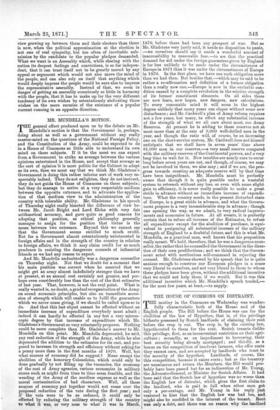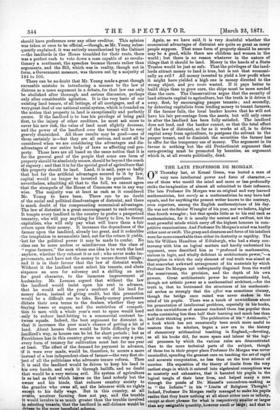THE HOUSE OF COMMONS ON DISTRAINT. T HE mutiny in the
Commons on Wednesday was wonder- fully characteristic both of the House and of the English people. The Bill before the House was one for the abolition of the law of Hypothec, that is, of the privilege hitherto possessed by Scotch landlords of claiming their rent before the crop is cut. The crop is, by the existing law, hypothecated to them for the rent. Scotch tenants dislike this privilege, first, as an inconvenient restriction on their agri- culture ; secondly, as an impediment to borrowing, their best security being already mortgaged ; and thirdly, as a bonus on the competition of insolvent farmers, who offer rents they cannot earn, and are accepted by landlords who trust to the security of the hypothec. Landlords, of course, like this competition, because it raises rents ; but as the tenantry are unanimous and return the Members, the Bill would pro- bably have been passed but for an indiscretion of Mr. Young, the Advocate-General, or Minister for Scotch Affairs. It had been said that the Scotch law of hypothec was no worse than the English law of distraint, which gives the first claim to the landlord, who is paid in full when other men get only a per-centage, and Mr. Young in his reply just ventured to hint that the English law was bad too, and might also be modified in the interest of the tenant. Bent was only a debt, and there was no reason why the landlord
should have preference over any other creditor. This opinion was taken at once to be official,—though, as Mr. Young subse- quently explained, it was entirely unauthorized by the Cabinet —the landlords in the House trembled for their rents, there was a perfect rush to vote down a man capable of so revolu- tionary a sentiment, the speeches became threats rather than arguments, and the Bill, which was in reality, though not in form, a Government measure, was thrown out by a majority of 184 to 105.
There can be no doubt that Mr. Young made a great though excusable mistake in introducing a menace to the law of distress as a mere argument in a debate, for that law can only be abolished after thorough and serious discussion, perhaps only after considerable agitation. It is the very basis of our existing land tenure, of all lettings, of all mortgages, and of a verygreat deal of our national social system, which is founded on the notion that property in land is exceptionally and perfectly secure. If the landlord is to lose his privilege of being paid first, to the injury of other creditors, he must ask more to cover his new risk, the value of land must slightly decrease, and the power of the landlord over the tenant will be very gravely diminished. All those results may be good—one of them certainly is—but they are all serious, and must all be considered when we are considering the advantages and dis- advantages of our entire body of laws as affecting real pro- perty. Those laws are all based on the same notion that it is for the general good of the people that some one form of property should be absolutely secure, should be beyond the reach of roguery ; and that it is for the special good of agriculture that this property should be land. Land, it is said, pays so badly that but for the artificial advantages secured to it by law, capital would no longer be invested in its purchase. But nevertheless, admitting all that to the full, we cannot agree that the stampede of the House of Commons was in any way wise. The majority was at least as rash as it considered Mr. Young to have been. There can be no doubt of the social and political disadvantages of distraint, and there is much doubt of the compensating economical advantages. The law of distraint is a great encouragement to rack-renting. It tempts every landlord in the country to prefer a pauperized tenantry, who will pay anything for liberty to live, to decent -capitalists, who will only pay what will leave them a fair return upon their money. It increases the dependence of the farmer upon the landlord, already too great, and it redoubles -the temptation to accumulate land, not for the return it yields, -but for the political power it may be made to confer. No
• class can be more useless or mischievous than the class of " rogue farmers," the men whose one idea is to work the land . anyhow, whether they exhaust it or not ; who never make im- provements, and have not the money to secure decent tillage ; and it is in their favour that the law of distraint works. Without it the landlord must select his tenants, and abate sixpence an acre for solvency and a shilling an acre for good character, to the immense improvement of husbandry. Mr. Leeman argued that without the law the landlord would insist upon his rent in advance, that he would sell the year's usufruct of his land for money down, instead of giving credit, but this precaution would be a difficult one to take. Ready-money purchasers dictate their own terms to the dealers, whether they are buying leases or sugars, and the restriction of competi- tion to men with a whole year's rent to spare would tend only to reduce land-letting to a commercial contract be- tween equals. Indeed, the best argument for distraint is. that it increases the poor man's chance of getting a bit of land. About houses there would be little difficulty in the landlord's way, as houses can be let for short periods ; but as Providence has in this country given us only one crop a year, every form of tenancy for cultivation must last for one year .at least. The effect of the demand for payment in advance, if it were ever made, would be, therefore, to secure a more instead of a less independent class of farmer—the very first ob- ject of all the politicians who advocate tenure reform. Then it is said the landlord would be driven to keep his land in Lis own hands, and work it through bailiffs, and no doubt that would be a very serious evil. No system of agriculture is so bad as that which leaves on the land nobody but the owner and his hinds, that reduces country society to the grandee who owns all, and the labourer with no rights except to his daily wage. But in this country, at all events, amateur farming does not pay, and the trouble it would involve is so much greater than the trouble involved in selecting tenants, that the landlord in self-defence would be driven to the more beneficial scheme. Again, as we have said, it is very doubtful whether the economical advantages of distraint are quite so great as many people suppose. That some form of property should be secure may be a good, while there are children and women in the world ; but there is no reason whatever in the nature of things that it should be land. Money in the hands of a State Trustee would be just as safe. That the privileges of the land- lords attract money to land is true, but is not that economi- cally an evil ? All money invested to yield a low profit when it might have yielded a high one is money directed to the wrong object, and pro tanto wasted. If it pays better to build ships than to grow corn, the ships must be more needed than the corn. The Conservatives argue that the security of land attracts capital to agriculture, but the truth is it drives it away, first, by encouraging pauper tenants ; and secondly, by deterring capitalists from lending money to tenant farmers. If the farmer fails, the local banker knows that he will not have his fair per-tentage from the assets, but will only come in after the landlord has been fully satisfied. The landlord does not lend, and the banker cannot, so that the total effect of the law of distraint, so far as it works at all, is to drive capital away from agriculture, to postpone the solvent to the pauper tenant, and to diminish the securities the farmer has to offer for the temporary use of money. The argument in its favour is nothing but the old Protectionist argument that corn-growing must be promoted by bounties, an argument which is, at all events politically, dead.



































 Previous page
Previous page